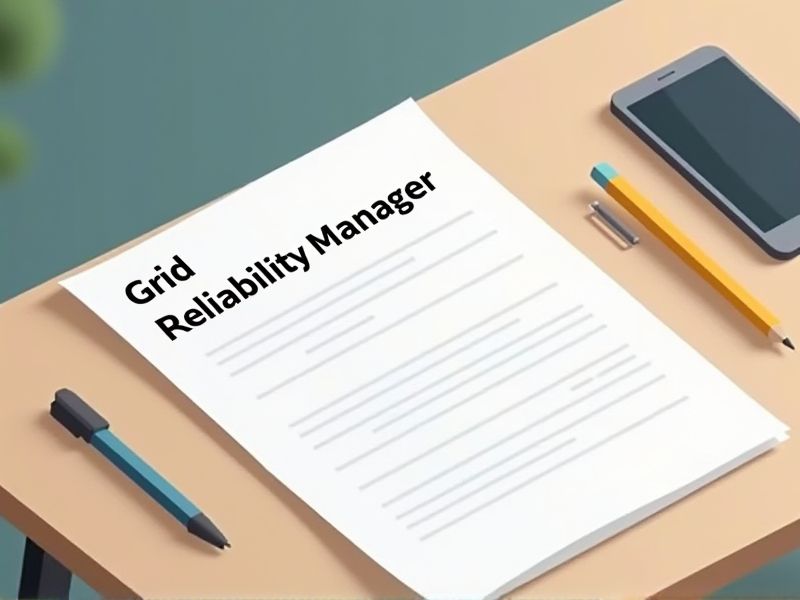
The role of a Grid Reliability Manager requires ensuring the continuous and efficient operation of power grids, which is critical for maintaining energy security and preventing outages. Specialized certifications demonstrate a manager's competence in managing complex grid systems and responding effectively to emergencies. These certifications validate the technical knowledge and problem-solving skills essential for making informed decisions in dynamic environments. Here are some important certifications you may need as a Grid Reliability Manager.
Professional Engineer (PE) in Electrical Engineering
A Professional Engineer (PE) in Electrical Engineering is essential for a Grid Reliability Manager because they possess the technical expertise necessary to design and evaluate grid infrastructure efficiently. Their licensure ensures they adhere to industry standards and regulations, which is critical for maintaining safety and reliability. They apply advanced problem-solving skills to anticipate and mitigate potential grid failures. Their expertise in electrical systems supports the integration of renewable energy, enhancing grid resilience and sustainability.
Certified Energy Manager (CEM)
The Certified Energy Manager (CEM) credential equips professionals with the skills necessary to improve system efficiency, directly impacting grid stability and reliability. A Grid Reliability Manager with a CEM background can better identify and implement energy-saving measures, reducing operational costs and strain on grid infrastructure. The training involved in earning a CEM credential enhances data analysis capabilities, leading to more effective energy management strategies that support grid performance. Possessing a CEM certification signals thorough understanding in energy dynamics, which is crucial for addressing grid challenges sustainably.
Certified Reliability Engineer (CRE)
Grid reliability involves ensuring the consistent operation of electrical systems, and any downtime can result in significant economic costs. A Certified Reliability Engineer (CRE) possesses expertise in system reliability, which directly addresses potential failures and downtimes. By employing a CRE, a Grid Reliability Manager can implement predictive maintenance strategies that reduce unforeseen disruptions. CREs use data-driven approaches to optimize system reliability, enhancing the overall efficiency and reliability of the grid.
NERC CIP (Critical Infrastructure Protection) Certification
NERC CIP Certification is crucial for Grid Reliability Managers due to the enforcement of comprehensive cybersecurity measures, reducing vulnerabilities in critical infrastructure. It ensures compliance with North American standards, contributing to the prevention of service disruptions. Certification equips managers with the necessary skills to identify and mitigate risks associated with cyber threats. This training fosters resilience in grid operations, thereby enhancing the reliability and integrity of energy distribution networks.
Smart Grid Professional Certification (SGPC)
The Smart Grid Professional Certification (SGPC) equips a Grid Reliability Manager with the necessary skills to effectively integrate new technologies into the grid, enhancing overall system resilience. With the growing complexity of energy networks, the certification ensures that professionals can address and mitigate potential operational risks. SGPC provides a comprehensive understanding of modern smart grid technologies, a critical factor in maintaining grid stability. As energy systems transition towards incorporating more renewable sources, certified managers are better prepared to manage these integrations, keeping the grid reliable.
Project Management Professional (PMP)
Having a PMP certification equips a Grid Reliability Manager with the structured methodologies essential for overseeing complex projects in energy infrastructure. This credential ensures adherence to proven project management standards, thus enhancing the effectiveness of grid reliability initiatives. In high-stakes environments like energy grids, PMP-certified managers are better prepared to mitigate risks and ensure projects stay on timeline and budget. The systematic approach of PMP aids in seamless communication and coordination across multidisciplinary teams, crucial for maintaining grid stability.
Lean Six Sigma Green Belt Certification
A Grid Reliability Manager faces complex challenges that require lean methodologies to enhance operational efficiency. Lean Six Sigma Green Belt Certification equips them with the necessary skills to systematically reduce waste and improve processes. Mastery of statistical analysis tools provided by the certification leads to data-driven decisions, bolstering grid reliability. In an industry where precision and efficiency are paramount, the certification serves as a pivotal asset in maintaining consistent and reliable grid performance.
ISO 55000 Asset Management Certification
ISO 55000 Asset Management Certification provides a structured framework for effective asset management, which enhances decision-making for Grid Reliability Managers. An organized asset management system minimizes operational risks and prolongs the life of grid infrastructure. The certification ensures compliance with international standards, fostering confidence among stakeholders in the grid's reliability. By integrating best practices from ISO 55000, Grid Reliability Managers can optimize resource utilization, resulting in improved overall grid performance.
Certified Energy Auditor (CEA)
A Certified Energy Auditor (CEA) helps identify and implement energy efficiency measures, reducing operational costs and increasing the financial sustainability of managing the grid. Efficient energy use contributes to grid stability by minimizing demand spikes and ensuring consistent energy supply. The technical expertise of a CEA enables the identification of potential vulnerabilities in grid systems, enhancing their reliability and resilience. With knowledge of the latest energy technologies and practices, a CEA can guide strategic investments that optimize grid performance and resource allocation.
Certificate in Electric Power Systems Engineering
A Certificate in Electric Power Systems Engineering equips a Grid Reliability Manager with a thorough understanding of power system dynamics, ensuring they can effectively manage and optimize grid operations. This specialized education provides insights into the complexities of grid reliability, enhancing decision-making for system stability and efficiency. The certification also prepares managers to implement innovative solutions in response to evolving energy demands and integration of renewable resources. Comprehensive knowledge gained from the certification supports effective crisis management during grid disturbances, ensuring consistent power supply.
Summary
You, as a Grid Reliability Manager, can expect enhanced credibility and trust in your professional capabilities when you obtain certifications. Certifications can lead to improved decision-making skills and knowledge about best practices in grid management. In turn, this expertise often results in higher efficiency and stability within the grid systems you oversee. Employers and stakeholders may regard you as a more valuable asset, possibly leading to career advancement opportunities.
